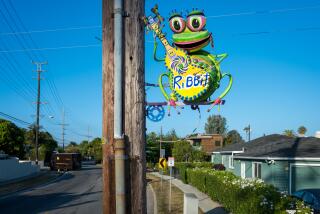Culver City Sued Over Law That Bans Signs
A Culver City woman is suing her city government for the right to post signs on public property advertising the upcoming municipal election.
Lynne Davidson, 48, spent $3,500 of her own money on 220 signs urging her neighbors to “Vote for a Change.” She said “embarrassingly” low voter turnouts of 20% for the city’s April elections, particularly during years with a March primary, prompted her to try to increase awareness.
“If you’re not a high-propensity voter, you’re not going to get the [campaign] letter from the candidate. You’re not going to see the local newspaper with information about the election,” she said.
“I thought if I did a little work,” things would change, Davidson said. The signs only urge people to vote and do not endorse a candidate or party.
But city officials objected to the posters, which Davidson paid an advertising company to mount on light posts along major streets. A Culver City ordinance prohibits signs from being posted in the public right of way, regardless of their content. Stephen Rohde, Davidson’s lawyer, called city enforcement of the law “highly subjective and discriminatory.”
Rohde sent a letter to the city attorney on March 13 listing 20 different political, commercial and public service signs that were posted in the public right of way for long periods of time. After city workers and police removed her signs on two occasions, Davidson chose to sue in federal court to defend what she says is her constitutional right to post a political sign on public property.
Rohde filed suit Wednesday in hopes of securing a temporary restraining order against any further sign removal. Rohde and Davidson are seeking a preliminary injunction that would let the signs stay up at least until the election on April 9.
The city counters that a 1984 U.S. Supreme Court decision, City of Los Angeles vs. Vincent, upholds a city’s right to avoid visual clutter by banning signs.
City Atty. Carol Schwab said public works employees usually remove signs after a complaint is made.
These ordinances do more than just protect the aesthetic feel of the community, officials say. Sign posters sometimes damage city property by affixing the signs with metal grommets and duct tape.
Culver City is investigating ways to assess a per-sign removal fee when signs are posted illegally, Schwab said. But it’s often impossible to track down the people responsible for posting the most common signs--those that advertise ways to lose weight or work at home.
Some cities, such as Carlsbad, allow political signs for a 40-day campaign season, said Ed Davidson, Carlsbad code inspector. Signs can be staked only in landscape areas along sidewalks--not attached to light posts or staked in medians, where they could interfere with drivers’ field of vision. Candidates are also required to leave a deposit to ensure that the posters will be removed in a timely fashion.
Culver City does not prohibit signs posted on residential property.
But Davidson had fewer than 10 signs placed on lawns, she said, because the majority of the city’s residents live in apartments or condominiums.
The concern about illegally posted signs in Culver City has been dramatically illustrated at several City Council meetings in the last year.
Councilman David Hauptman has made the issue a personal crusade, bringing in fistfuls of fliers he has removed from area poles.
He leaves what he has named the “Hauptman Hook” in his pickup, so he can pull over and remove any offending signs he encounters while driving.
“It’s such a blight,” he said, likening illegal signs in a city to slapping a sticker on the “Mona Lisa.”
But Davidson has a different opinion.
“I think political signs are gorgeous,” she said. “They’re a real sign of an active democracy.”
More to Read
Sign up for Essential California
The most important California stories and recommendations in your inbox every morning.
You may occasionally receive promotional content from the Los Angeles Times.









